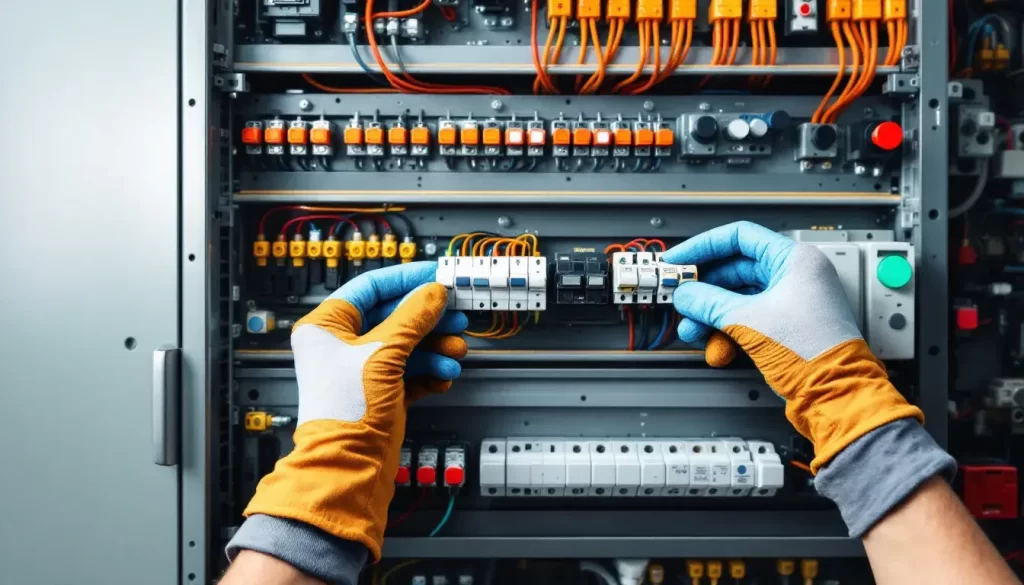How Do I Choose A Fuse Holder?
Table of Contents
ToggleElectrical fuse holders securely house fuses, ensuring circuit protection and easy replacement. This guide covers everything you need to know about different types and how to choose the right one.
Key Takeaways
- Fuse holders are crucial for securely enclosing fuses and preventing circuit damage by providing short circuit and overload protection.
- Selecting the appropriate type of fuse holder—panel mount, inline, or PCB-mounted—is essential for enhancing circuit reliability and accommodating specific application needs.
- Key considerations when choosing fuse holders include voltage and current ratings, compliance with safety standards, and cost-effectiveness for long-term performance.
Understanding Electrical Fuse Holders
Fuse holders are essential components in electrical circuits, designed to securely enclose fuses while allowing for easy replacement and inspection. They play a crucial role in maintaining system safety and reliability by protecting fuses from damage and exposure. Fuse holders secure the fuse, allowing it to effectively perform its primary function of providing short circuit and overload protection.
In addition to securing fuses, fuse holders facilitate the overall integration and operation of fuses within electrical circuits. This integration is vital as it helps prevent excessive current from damaging the circuit, ensuring smooth and reliable operation. Without proper fuse holders, the safety and efficiency of electronic circuits would be compromised, leading to potential hazards and system failures.
Types of Fuse Holders
Fuse holders come in several designs, each suited for different uses. Here’s a simple breakdown:
Panel Mount Fuse Holders
- Use: Often found in control panels.
- Benefit: Easy to access for quick fuse changes.
- Example: Used in home electrical panels.
Inline Fuse Holders
- Use: Connects directly into a wire line.
- Benefit: Great for tight spaces like cars.
- Example: Common in automotive wiring.
PCB-Mounted Fuse Holders
- Use: Mounted directly on printed circuit boards.
- Benefit: Saves space on the board.
- Example: Found in compact electronics like smartphones.
Key Considerations
- Voltage Rating: Ensure the fuse holder can handle the circuit’s voltage.
- Current Rating: Match the holder to the circuit’s current requirements.
- Size: Choose a holder that fits your space constraints.
Understanding these types helps you pick the right one for your needs, ensuring your circuits are safe and efficient. Always check the specifications to match your requirements.
Selecting the Proper Fuse Holder

Selecting the right fuse holder is important to keep electrical systems safe and reliable. Here’s what you need to know:
Key Points to Consider
- Voltage Rating: The fuse holder should handle more voltage than the circuit needs. This prevents failures and keeps the system safe. For example, if your circuit operates at 120V, choose a fuse holder with a voltage rating above that.
- Current Rating: Match the fuse holder to the circuit’s current needs. If your circuit’s normal current is 1 Amp, ensure the fuse holder can handle this. It’s also crucial to consider temporary surges from devices like motors.
- Size and Mounting: The fuse holder should fit your available space. For instance, panel mount fuse holders are easy to access and replace, while PCB-mounted holders save space on a circuit board.
Safety Standards
- Make sure the fuse holder meets safety certifications like UL or IEC. This ensures it’s tested for safety and reliability.
Why It Matters
Choosing the right fuse holder helps avoid issues like explosions or electric arcs, ensuring your system runs smoothly and safely. By understanding these basic points, you can make informed decisions and keep your circuits protected.
Summary
This blog highlights the importance of selecting the right fuse holders for electrical systems. It covers types such as panel mount, inline, and PCB-mounted, and emphasizes key considerations like voltage and current ratings, size, and safety standards. Proper selection ensures circuit protection and efficiency.
Remember, investing in quality fuse holders enhances system safety and longevity. For more insights on optimizing your electrical systems, explore our detailed guides. Ready to upgrade your circuit protection? Contact us today to find the perfect fuse holders for your needs!
Tel: +86-577-88671000
E-mail: ceo@tosun.com
Skype: tosunelectric
Wechat: +86-139 6881 9286
WhatsApp: +86-139 0587 7291
Address: Room No.1001 Wenzhou Fortune Center,Station Road, Wenzhou, China
REQUEST A QUOTE
WhatsApp us
 : +86-139 0587 7291
: +86-139 0587 7291 English
English Español
Español Русский
Русский Français
Français العربية
العربية Português do Brasil
Português do Brasil Українська
Українська Türkçe
Türkçe Polski
Polski Nederlands
Nederlands Italiano
Italiano Bahasa Indonesia
Bahasa Indonesia हिन्दी
हिन्दी اردو
اردو አማርኛ
አማርኛ Հայերեն
Հայերեն ไทย
ไทย Монгол
Монгол فارسی
فارسی Shqip
Shqip Ελληνικά
Ελληνικά



